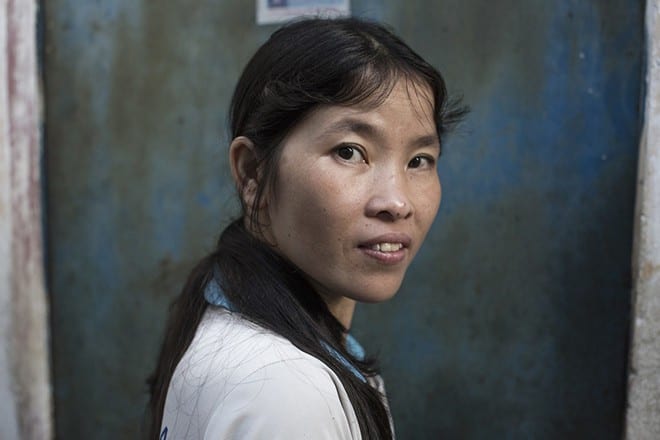
Lan, 32, works in a factory in Dong Nai province, southern Vietnam, which produces shoes for global fashion brands. She works on 1200 pairs of shoes a day, yet she can’t afford to buy even one pair for her son on the amount she earns each month. Photo: Sam Tarling/Oxfam
Blog post by Nick Bryer
Oxfam Global Inequality Lead (Davos)
Oxfam’s new inequality report is bound to ruffle feathers at the World Economic Forum – the annual get together of the rich and powerful in Davos, Switzerland.
Some will accuse us of being ‘anti-rich’, and of focusing on billionaires because we’re jealous of their success. They will say we should be focusing on the hundreds of millions of people who are still trapped in poverty, rather than on those at the top who are doing so very well for themselves.
Two sides of the same coin
Don’t be fooled. We are absolutely focused on people living in poverty. What has become increasingly clear over the years, however, is that there’s no way we’re going to end poverty unless we tackle extreme wealth too. They are two sides of the same coin.
The reality is that all too often the fortunes of the super-rich have been amassed at the expense of the rest of us – and especially the workers and producers who are at the bottom of every global supply chain.
An economy for the rich
The insatiable pursuit of profit by giant corporations and their rich shareholders is fuelling an epidemic of tax dodging that is depriving developing countries of at least $170 billion every year – money that should be going to schools and hospitals. It is driving down wages and working conditions across the globe, leaving hundreds of millions of people in dangerous and difficult jobs, struggling to earn enough to get by.
It is no coincidence that most of these people are women.
The effects of inequality
Women like Lan, who is a garment worker in Vietnam, working in a factory far from her home. Lan’s pay is so low, and she has to work so much overtime, that she goes months at a time without seeing her young children. She will earn in her lifetime what a CEO of a top garment company earns in just ten days. Or Dolores, who works in a US poultry factory, and has to wear diapers to work because she isn’t allowed to take toilet breaks. And that’s in the richest country on earth!
A broken system
So yes, if people are getting rich at the expense of others, we have a problem with that.
If companies are paying out huge dividends to their rich shareholders and bumper pay packets to their top executives, while workers in their supply chains aren’t earning enough to feed their families, then yes, we have a problem with that.
If billionaire fortunes are the result of monopolies, of crony capitalism, of vast inherited wealth – the gilded results of a broken economic system that rewards wealth rather than work – yes, we have a problem with that.
Of course, it is true that some billionaires contribute a lot to our societies. Many are pioneers in their fields, innovators and risk-takers who have created things we can all enjoy and benefit from. Many of them are very generous philanthropists, giving away vast sums of money to help those less fortunate than them.
But this doesn’t change the fact that they are the beneficiaries of a broken economic system that is enriching them first and foremost at the huge expense of millions of others who remain trapped in poverty.
Toward a fairer, more human economy
We need a different kind of economy now. One that shares value more fairly. One that treats women as well as it treats men. One that increases prosperity and well-being for all, without trashing the planet in the process. An economy that rewards work, not wealth.
We need to see governments acting in the interest of ordinary workers – implementing and enforcing living wages, limiting excessive rewards for investors and top executives, regulating new technologies to ensure they benefit the majority, cracking down on tax dodging, investing in healthcare and education for all.
And we need businesses that are ready to act in the interests of their workers and wider society, and not just rich shareholders. That means more responsible tax behaviour, it means ensuring better working conditions, it means no longer paying out big dividends until they can be sure that everyone in their supply chain is being paid enough to live a decent life.
Say goodbye to poverty
These are necessary, practical steps that can help us consign both extreme wealth and extreme poverty to the history books.
You can help spread the word and join the growing global demand for governments and big businesses to do things differently.





